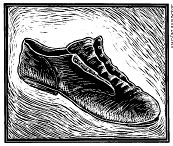Viewpoint
Desperately seeking humanity
By Dean J. Seibert, M.D.
In desperate situations, when basic needs are unfulfilled and the thin veneer of civilized society is stripped away, whether by human action or by natural catastrophe, ethical issues can become both painfully focused and impossibly blurred.
I have seen the benefits that can be wrought by help rendered in the absence of any hidden agenda or self-interest, in response to a purely humanitarian impulse. But I have also seen how political goals can subvert supposedly humanitarian actions. After Central America was devastated by Hurricane Mitch, I led a medical team to La Mosquitia, near where intense fighting had taken place in the 1980s between Nicaraguan government forces and the American-supported contras. I was told by my interpreters about a glistening hospital and clinic that had been funded by wealthy Americans. But now that these peasants are no longer a factor in U.S. interests, the hospital—still fully equipped—stands immaculate, locked, and empty. The promise of medical care now seems to these poor farmers just a subterfuge to achieve political goals.

|
|
They were released from prison with no personal possessions
except the clothes on their backs—not even their shoelaces. |
Immorality: More recently, I was in Albania, helping to care for ethnic Kosovars driven from their homes by the policies of a megalomaniac leader who invoked Christian mythology to justify genocide against Moslems. I found it difficult to isolate medical ethical dilemmas from the fundamental immorality of the situation.
When my team arrived in Shokdra, Albania, there were 28,000 Kosovar refugees in and around the city. Conditions were appalling. An abandoned tobacco warehouse, for example, housed 5,000 refugees—400 families per floor, separated only by plastic drapes. Some had witnessed the death of loved ones; others suffered the heartwrenching uncertainty of missing family members. Many of their medical problems were mundane, others were not. People with chronic illnesses had had no medications for months. Cancer patients had postponed treatment for disfiguring and potentially lethal skin lesions out of fear of the Serbian Kosovar medical establishment. And everywhere, there was anxiety and profound depression that we could do little to alleviate.
I also worked at the former train station—the destination for 50,000 refugees who had crossed the border within Serb artillery range. Many of the men were just out of Serbian prisons, where they had been systematically beaten, forced to beat one another, and psychologically brutalized. They were released with no personal possessions except the clothes on their backs—not even their shoelaces. Worst of all, they had no knowledge of the whereabouts of their families. There was little we could do except offer painkillers and sympathy. Nevertheless, a hand on the shoulder or a word of encouragement often seemed to start a healing process.
Catastrophe: One day I saw a six-year-old boy who was suffering his tenth seizure of the day. He was mentally and physically crippled from meningitis and weighed perhaps 40 pounds. He was severely brain damaged, unable to move because of contractures, and practically unable to swallow. Death was not far off. His parents had been encouraged to leave him behind in the family's rush for safety, since his handicaps could have put the rest of them in peril. Nevertheless, the parents had carried him in their arms to relative safety. My first instinct was to have them take the boy to a nearby Austrian military field hospital, where more could be done for him. I began to explain this, but the parents stopped my interpreter in mid-sentence and said, "We know our son is going to die. But perhaps the doctor has something that will control his seizures—he has had nothing in weeks." I felt a twinge of chagrin that my initial impulse had been to address the problem as a medical emergency rather than a catastrophe for a loving family.
As an individual, I am willing to accept war as a solution only in extreme circumstances. However, I felt no ethical dilemma whatsoever about the use of force to confront the genocide I was witnessing. And I saw no ambivalence on the faces of the young men and women of the U.S. military who worked beside us at the train station. As privates and sergeants and lieutenants laid aside their weapons and bent to carry children, or to help those too weak to help themselves, it was clear they knew exactly why they were in the Balkans.
Spirit of hope: A few months later, I had an opportunity to visit Kosovo. There, I saw caskets bearing bodies found in mass graves. I saw mosques that had been destroyed by Serbs, and Serbian churches destroyed in retaliation. What really impressed me, however, was not the evidence of reprisals, which drew much media attention, but the restraint exercised by the Albanian Kosovars. Most of all, I was impressed with the spirit of hope demonstrated by the Kosovar refugees as they struggled to put their shattered lives back together.
In the chaos of Albania, it was difficult to know whether what we could do medically was significant. Yet as I observed the throngs in a Kosovar city that six weeks before had been described as a ghost town, I felt that in small but important ways we had made a difference in the lives of those now reuniting on the streets before me.
Seibert is an active emeritus associate professor of medicine at Dartmouth.
